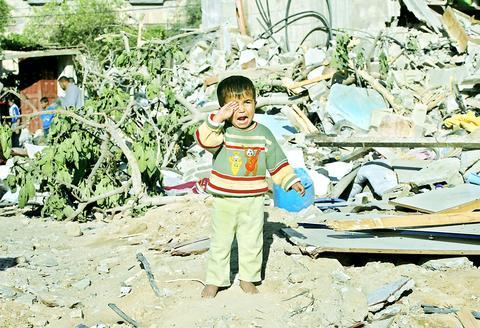Israeli tanks and troops began withdrawing from Rafah refugee camp yesterday under international pressure to end three days of fighting in which 41 Palestinians were killed.
An Israeli military source said a "redeployment" was under way.

PHOTO: REUTERS
The Israeli army, saying it was searching for weapons-smuggling tunnels dug under the Egypt-Gaza border, sent dozens of tanks and hundreds of troops into Rafah on Tuesday in the biggest Gaza raid in years after militants killed 13 soldiers.
Israeli security sources said a smaller contingent would remain in Rafah, a militant stronghold, for an undefined period of time.
As troops withdrew, leaving behind torn-up roads and toppled power lines, hundreds of residents in the Brazil neighborhood returned to their homes to find some 25 had been destroyed while they had taken refuge away from the violence.
"We took our children away and fled for our lives and as you see the houses are completely demolished," Rafah resident Naeema Abu-Jerida said.
"Thank God we had time to leave, but we had no chance to take any of our belongings with us," Abu-Jerida said.
International pressure on Israel to quit the area mounted after its forces killed 10 Palestinians at a peaceful protest in Rafah on Wednesday. Troops said they did not aim to hit the rally.
US President George W. Bush's administration showed rare displeasure with Israel by not vetoing a UN resolution urging an end to the violence.
In Washington, a senior State Department official said Israeli Vice Premier Ehud Olmert had assured the US it would not demolish any more homes in Rafah or widen an adjacent flashpoint buffer zone on the Egyptian frontier.
"Olmert did tell us when he came in Tuesday that there would not be further demolition of houses and that they were not going to widen the strip. We'll see what happens," said an official who asked not to be named.
Israeli Attorney General Menachem Mazuz on Thursday instructed the army to recast its plan to expand the Israeli-patrolled buffer area dubbed "Philadelphi Road" to limit the number of Palestinian homes that would be razed, Israeli media reported.
Israel's army chief had threatened to destroy hundreds of houses in a bid to boost security for soldiers who come under constant attack in the border strip.
"My house was toppled on our heads," recalled Nabil Hassan, 52, as he stood on the rubble of his home yesterday.
"The army did not warn us, did not ask us to leave, they started while we were still inside," he said.
He said he and his family of 13 had taken shelter in a bathroom as bulldozers continued working but managed to get out after a neighbor told soldiers they were still inside.
In apparent preparation for the partial pullout, soldiers distributed leaflets in Rafah listing names of wanted militants and warning residents against cooperating with them.
"These people are sabotaging your life with their terrorist activity," the leaflets said.

China yesterday held a low-key memorial ceremony for the 1937 Nanjing Massacre, with Chinese President Xi Jinping (習近平) not attending, despite a diplomatic crisis between Beijing and Tokyo over Taiwan. Beijing has raged at Tokyo since Japanese Prime Minister Sanae Takaichi last month said that a hypothetical Chinese attack on Taiwan could trigger a military response from Japan. China and Japan have long sparred over their painful history. China consistently reminds its people of the 1937 Nanjing Massacre, in which it says Japanese troops killed 300,000 people in what was then its capital. A post-World War II Allied tribunal put the death toll

FALLEN: The nine soldiers who were killed while carrying out combat and engineering tasks in Russia were given the title of Hero of the Democratic People’s Republic of Korea North Korean leader Kim Jong-un attended a welcoming ceremony for an army engineering unit that had returned home after carrying out duties in Russia, North Korean state media KCNA reported on Saturday. In a speech carried by KCNA, Kim praised officers and soldiers of the 528th Regiment of Engineers of the Korean People’s Army (KPA) for “heroic” conduct and “mass heroism” in fulfilling orders issued by the ruling Workers’ Party of Korea during a 120-day overseas deployment. Video footage released by North Korea showed uniformed soldiers disembarking from an aircraft, Kim hugging a soldier seated in a wheelchair, and soldiers and officials

‘NO AMNESTY’: Tens of thousands of people joined the rally against a bill that would slash the former president’s prison term; President Lula has said he would veto the bill Tens of thousands of Brazilians on Sunday demonstrated against a bill that advanced in Congress this week that would reduce the time former president Jair Bolsonaro spends behind bars following his sentence of more than 27 years for attempting a coup. Protests took place in the capital, Brasilia, and in other major cities across the nation, including Sao Paulo, Florianopolis, Salvador and Recife. On Copacabana’s boardwalk in Rio de Janeiro, crowds composed of left-wing voters chanted “No amnesty” and “Out with Hugo Motta,” a reference to the speaker of the lower house, which approved the bill on Wednesday last week. It is

Cozy knits, sparkly bobbles and Santa hats were all the canine rage on Sunday, as hundreds of sausage dogs and their owners converged on central London for an annual parade and get-together. The dachshunds’ gathering in London’s Hyde Park came after a previous “Sausage Walk” planned for Halloween had to be postponed, because it had become so popular organizers needed to apply for an events licence. “It was going to be too much fun so they canceled it,” laughed Nicky Bailey, the owner of three sausage dogs: Una and her two 19-week-old puppies Ember and Finnegan, wearing matching red coats and silver